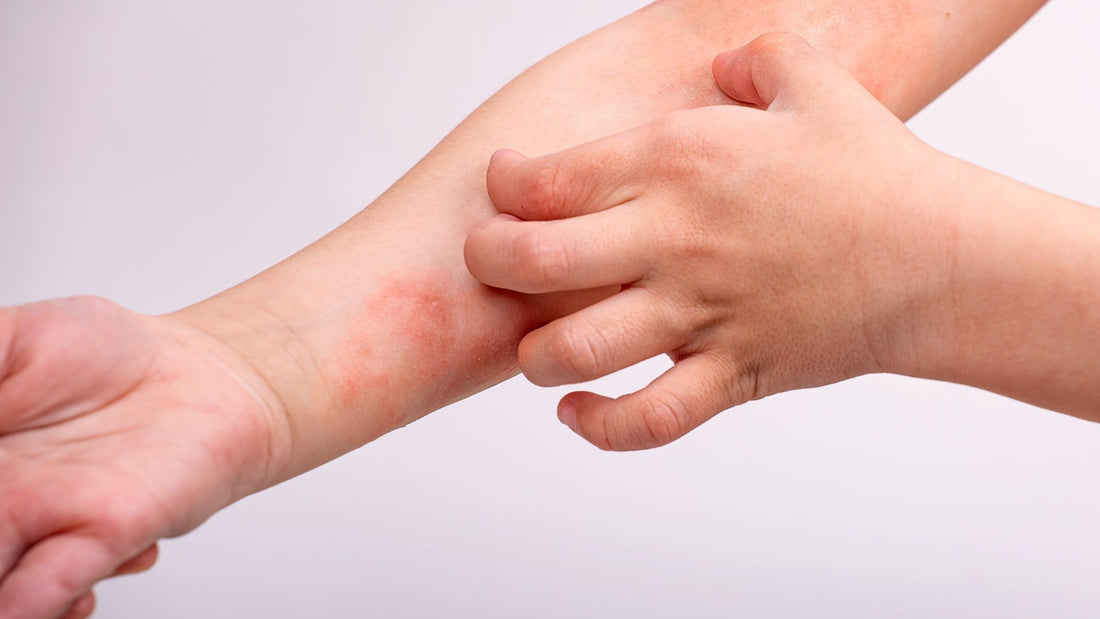
Eczema: Causes, Treatments, and Prevention for a More Comfortable Daily Life
What are the causes of eczema?
Eczema is not caused by a single reason, but by a complex interaction between several biological, environmental, and psychological factors. The most prominent causes are:

Genetic Factors and Gene Mutations
Recent studies indicate that mutations in the filaggrin (FLG) gene play a major role in eczema development. This protein is essential for maintaining the skin’s natural protective barrier. When it is absent or deficient, the skin becomes more prone to dryness and cracking, making it easier for irritants and microbes to penetrate.

Weak Skin Barrier
Healthy skin locks in moisture and keeps harmful substances out. In eczema, this protective layer is weakened, allowing water loss and the penetration of environmental irritants.

Environmental Triggers
Several external factors can worsen eczema symptoms, such as:
-
Dry or cold air
-
Fragrances and harsh cleaning agents
-
Pet dander
-
Dust and pollen
-
Rough or wool fabrics

Food Allergies
In some individuals—especially children—certain foods may trigger eczema flare-ups, including:
-
Dairy products
-
Eggs
-
Peanuts and tree nuts
-
Wheat and soy

Stress and Emotional Pressure
Psychological stress is one of the often-overlooked triggers. Stress increases inflammation in the body and can intensify symptoms, creating a “vicious cycle” of itching and anxiety.
Treatment Options for Eczema
While there is currently no permanent cure, medical advancements have provided a wide range of treatments to control symptoms and prevent flare-ups:
1. Daily Moisturizing
Moisturizing is the cornerstone of eczema care. Recommended ingredients include:
-
Ceramides
-
Fatty acids
-
Glycerin or hyaluronic acid
Apply moisturizer immediately after bathing to lock in hydration.
2. Topical Corticosteroids
Used to reduce inflammation and itching during flare-ups. They must be applied in measured doses under medical supervision to avoid side effects.
3. Calcineurin Inhibitors
Medications such as tacrolimus and pimecrolimus are safe for long-term use and do not thin the skin, making them especially suitable for sensitive areas like the face
4. Antihistamines
These may help reduce nighttime itching or in cases of allergy-related eczema, though they do not address the root cause.
5. Phototherapy
Controlled exposure to UVB light under medical supervision can be helpful for moderate to severe cases.
6. Biologic and Immunosuppressive Treatments
Drugs such as dupilumab represent a recent breakthrough for moderate to severe eczema and are administered via injection.
7. Probiotics and dietary supplements
Some studies indicate the role of probiotics in improving the balance of the immune system through the gut, which may help reduce symptoms, especially in children.
Prevention methods and daily care
To prevent eczema and reduce its flare-ups, it is recommended to follow a preventive lifestyle that includes the following:
Skin care
-
Use fragrance-free and alcohol-free moisturizers daily, even during periods when symptoms do not appear.
-
Avoid long showers or using very hot water.
-
Dry the skin gently with a soft towel without rubbing.
Choosing clothing
-
Wear soft cotton clothes that allow the skin to breathe.
-
Avoid wool or synthetic fabrics that cause friction.
Controlling stress
-
Set aside time for relaxation and meditation or practicing yoga.
-
Sleep well and avoid psychological triggers as much as possible.
Diet
-
Monitor foods that trigger symptoms and avoid them.
-
Make sure to eat foods rich in omega-3 and probiotics to support immunity.
Using gentle products
-
Choose skin cleansers and soaps free of sulfates and fragrances.
-
Wash clothes with detergents designed for sensitive skin.
Conclusion
Eczema is not just a superficial skin problem, but a condition that requires a comprehensive understanding of the factors that affect it and continuous skin care. With proper diagnosis, commitment to appropriate treatment, and adopting a healthy lifestyle, flare-ups can be reduced, and quality of life can be significantly improved.For any consultation or special recommendation, do not hesitate to contact us — we are here for you!








